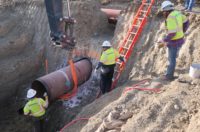
Every pipeline is ugly, intrusive and potentially dangerous, no matter how barren the land that it crosses. In the best of all worlds, we would be charging our car batteries with hundreds of thousands of megawatts of electrical power from solar panels or wind turbines. That day isn't here yet, so the controversial TransCanada XL Keystone pipeline, which is set to run from Alberta to Texas, is a necessary economic evil, like all pipelines.
With more than 1,711 miles of 36-in.-dia steel pipeline, there is much that could go wrong, beginning with between one or two spills a year greater than 2,100 gallons, according to the State Dept.'s draft environmental impact statement. Crude oil and bitumen could be pumped out of any break under high pressure. Land and water—including the Northern High Plains Aquifer system, which supplies almost eight out of every 10 gallons of water to Nebraska—could be exposed to toxicity from a spill.
Bond the Risk of Spill Cleanup
The risk of damage is unfortunate, and we urge all federal authorities to require TransCanada to bond or in some form post security for the possible environmental and economic damage from spills.
However, it's important to keep in mind the realities of the current situation in light of the environmental risks. All forms of energy involve regrettable trade-offs, such as the need for new electrical transmission lines on public or private land or erecting huge turbines on land or sea.
Recovering oil from the Alberta oil-sands region has always involved much damage to the environment, but we don't see it as our place to lecture Canadians about pollution and the exploitation of natural resources. The idea of turning away the oil from Canada because of its higher greenhouse-gas profile—about 17% higher than other fossil fuels, according to some sources—strikes us as a luxury, not a life-and-death issue. Climate change is important, but not as urgent as the need for ample energy security and putting people to work. We note that members of the laborers' union who have participated in the “Occupy Wall Street” protests support construction of the pipeline.
The U.S. and the rest of the world will be dependent on fossil fuels for the foreseeable future. The risks posed by the Keystone XL pipeline are not substantially more catastrophic than the risks we run every day with the hundreds of thousands of miles of pipeline that crisscross our country. Acting as if the future of climate change hinges on this one big pipeline is just the kind of apocalyptic nonsense we don't need.
Industry sources suggest building the pipeline would take up much of the work capacity of pipeline contractors. That's good, unless you put amorphous goals about climate change ahead of a higher level of energy security and the need to put more people to work.




